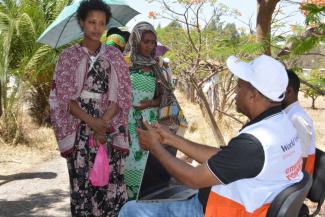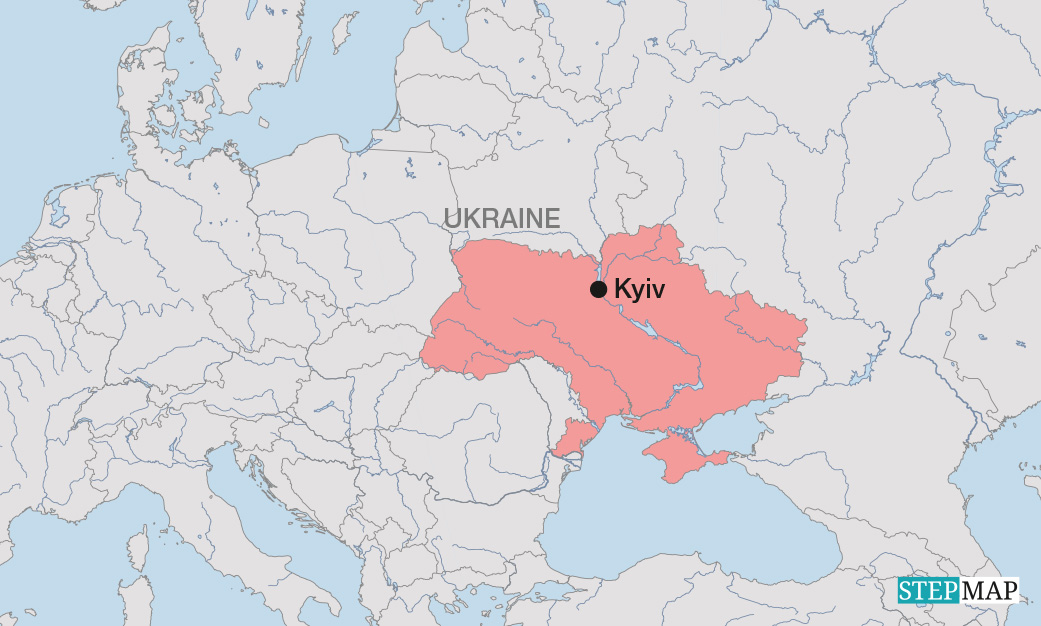Humanitarian aid
Digital platform makes emergency assistance easier

In order to provide assistance quickly and efficiently during disasters, humanitarian actors need reliable information. We work for the Christian aid organisation World Vision, which has numerous offices in countries around the globe, including in Germany. In emergencies, we have to know: Who is affected, and how? Who can be helped, and how? What is most urgently needed?
In case of a flood disaster, for example, we send a team to the affected area within 72 hours. Its job is to provide emergency relief and to conduct what we call “rapid needs assessment”. Next, we do our best to find out what help is most urgently needed. For instance, water lines are often damaged and markets may no longer work because of disrupted supply chains. Such information helps to determine to what extent we need to organise water trucks or distribute food.
If markets are still functioning, we often give out cash or vouchers. The people affected will then decide for themselves what they need most. This approach is more dignified and, moreover, often more effective.
In cooperation with local authorities, we determine who needs attention most and find the people most affected. It could be single parents, households with more than three children, people with disabilities or the aged. World Vision registers them as beneficiaries based on pertinent criteria. Thus we ensure that the support reaches the target groups precisely.
They countersign once they have received assistance. Their confirmation is important in terms of guaranteeing the scope and quality of our measures. It also facilitates proper oversight of how we use private donations and government funds. We must give account to those who support us financially and ensure that their money serves the intended beneficiaries. Under the direction of governments and UN organisations, we also work to avoid duplications in the distribution of goods, cash or vouchers.
A digital solution
In the past, we carried out most of these tasks with paper and pen, consolidating all information manually. Transcribing the information took time, however, and was error-prone. We accumulated masses of paper folders, which were then tediously scanned. Storing all documents safely was a serious challenge.
World Vision was one of the first humanitarian organisations that developed digital tools for registration, distribution and reporting. We use it for humanitarian aid in general and in disasters in particular. Our platform, “Last Mile Mobile Solutions” (LMMS), facilitates digital and non-physical registration offline. The system is fast and precise. Since 2008, LMMS has registered over 10 million beneficiaries and managed over $ 100 million of cash distributions. It is used by 20 different organisations in over 30 countries around the world (see box).
We only collect the most essential data and only pass them on if necessary to identify beneficiaries in distribution efforts and to verify that measures reach them as planned. These data include a photo, their name, the number of family members or, if available, an identification number.
After being registered on the LMMS platform, beneficiaries receive an ID card. They can use it to collect the aid they are entitled to (both goods or cash) at World Vision’s distribution sites. Where the situation permits, the ID card can also be used to open a bank account, allowing people to decide on their own how much cash to withdraw and when. Digital money transfers are particularly helpful when a disaster forces people to flee and they are on the move. In cooperation with state institutions, we sometimes contribute money to existing pension systems so beneficiaries will receive assistance that way. These approaches obviously depend on fully operational financial service providers and social security systems.
LMMS is very helpful when it comes to supporting people in areas that are difficult to access. Thanks to its offline capabilities and low connectivity requirements, we do not depend on broadband or Wi-Fi coverage. We can manage transactions where the people are, covering the “last mile”. In remote areas, we often use a hotspot to save data sets on a data storage device. Once we have internet access again, the data is automatically uploaded to our central system.
Data sovereignty is important
As important as technological advances are for our work, it is equally important that people are neither reduced to data nor rendered “transparent”, which would make them even more vulnerable than they already are. Their dignity must be respected, and their individual needs should be considered. They should share their data voluntarily, so disclosure must not be a precondition for receiving desperately needed support. Beneficiaries must be protected from data abuse, particularly in places where marginalised and needy people are discriminated against or even persecuted by their own government.
World Vision and other agencies are therefore boosting training in digital literacy. We teach our teams as well as beneficiaries. Topics include:
- why we collect data,
- what we will do with the information,
- when it will be deleted and
- what rights people have in regard to their own data.
We explain UN rules on human rights as well as national laws.
Moreover, beneficiaries should be able to decide what personal information is shared with whom and when. For that purpose, we use an app which can be installed on smartphones and, like LMMS, can be used in many languages.
Currently, World Vision is launching a project to promote decentralised data use between international organisations. It aims at developing international standards for the ethical, efficient and systematic exchange of data in the distribution of cash or vouchers. We are doing this as part of the Collaborative Cash Delivery Network, a platform of 14 civil society organisations seeking to improve their cash programmes. The project gets funding from the European Commission. A test run is planned in South Sudan this year as a component of an emergency aid project.
Link
https://www.collaborativecash.org/
Melanie Assauer is Senior Coordinator for Disaster Management at the German section of World Vision.
melanie.assauer@wveu.org
Eric Kiruhura is Digital Humanitarian Systems Advisor at World Vision International.
eric_kiruhura@wvi.org
Chris Jansen is Senior Director of Disaster Management, Advocacy and Grants at World Vision International.
chris_jansen@wvi.org











